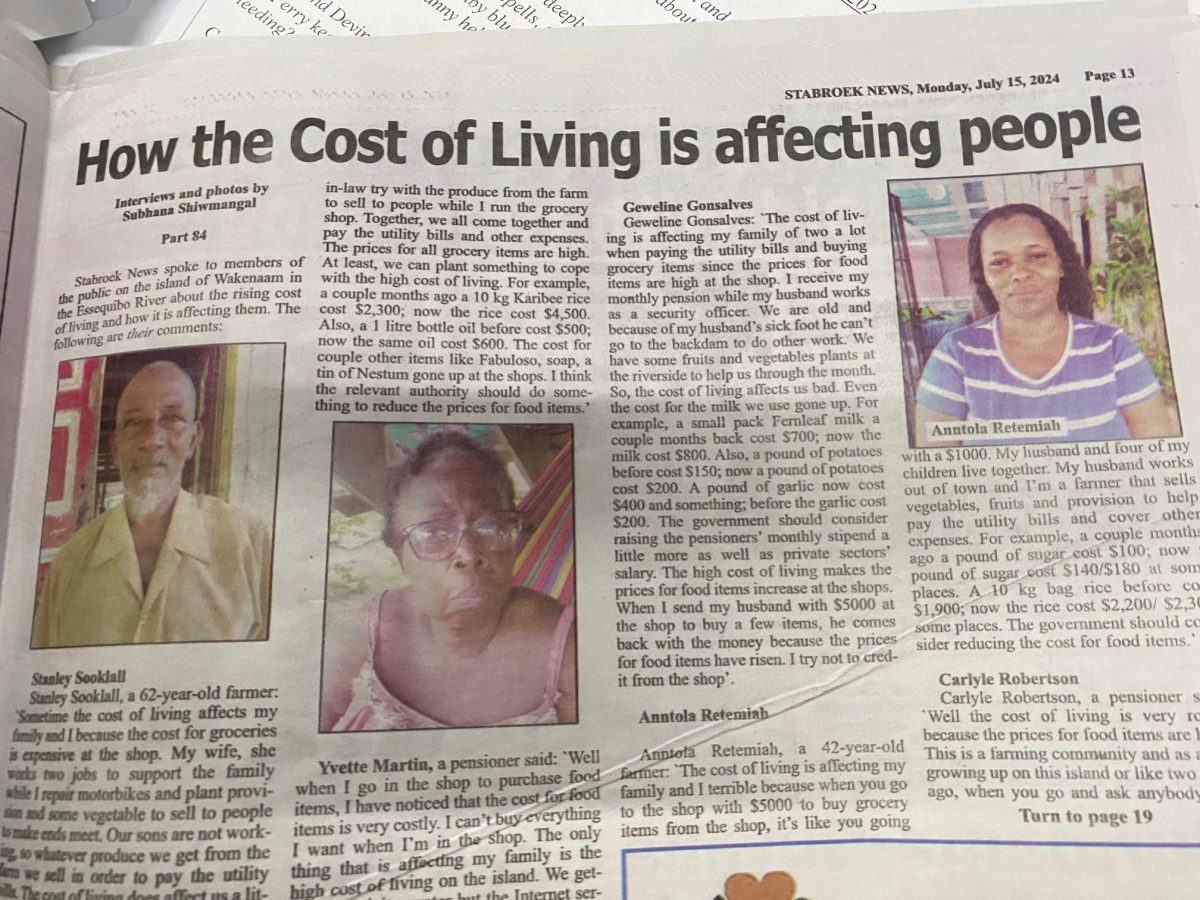-Jagdeo says many initiatives have been taken
APNU and the AFC have hit back at the government over what they see as the downplaying of a serious rise in the cost of living.
The issue has been brought into the spotlight by a long-running series in the Stabroek News which interviews people all across the country on the cost of living and which has underlined a sharp rise in prices in all sectors and the difficulty with making ends meet.
Vice President Bharrat Jagdeo has derided the testimonies reported by this newspaper and contended that the efforts being made by the government to ease the cost of living are not being reflected in the interviews.
The Office of the Leader of the Opposition (OLO) in a release on Friday referred to a recent article in Stabroek News which reported Jagdeo as claiming that his government continues to actively ease the cost-of-living burden on its citizens and according to the release, in doing so, sought to discredit the newspaper’s weekly Cost of Living series as “a political ploy” and to dismiss the grievances expressed by citizens as biased.
The OLO release noted that several commentators have “correctly” observed that Jagdeo “must be living in an alternate universe, or he is detached from the reality faced by ordinary Guyanese.”
The Opposition expressed the view that the Vice President’s attempts to dismiss the daily hardships of ordinary Guyanese are directly due to his and his party’s “heartlessness” for the plight of the vast majority of citizens across all regions and ethnic groups and the fact that “they live an elitist life and not in touch with the sufferings of the people of Guyana.”
Further, as far as it is concerned, Jagdeo’s use of abstract figures on expenditures to defend his government only adds insult to injury, suggesting that he should instead, visit the homes and kitchens of ordinary citizens if he is really interested in knowing how they fare, and opining that he is not that interested.
The release posited that struggling Guyanese, including those who voted for the PPP, must reflect on Jagdeo’s continued rejection of high cost of living and poor living standards as their daily reality, and when they do, they will most likely conclude – if they haven’t already – that “under the PPP government, life in Guyana is a burden that will not get better once it remains in office.”
It went on to accuse the PPP of having priorities that are directed towards their business friends, families and favourites, while the PPP’s reliance on large expenditures on infrastructure only creates false hopes for the many Guyanese on the lower and middle rounds of the economic ladder.
The Opposition criticised Jagdeo’s position that fuel subsidies increase the spending power of the masses as an ineffective approach to ease living costs, arguing that such subsidies do not adequately trickle down to the ordinary citizens and those who least need a subsidy – the already well-to-do – benefit the most while the most needy benefit the least. Moreover, it dismissed the PPP’s claim that it has increased disposable income by tens of billions of dollars as a mirage, as most of it has been swallowed up by the high and increasing cost of living.
Jagdeo’s assertion at his press conference that this is how the free market works “further exposes his indifference and his cluelessness in economic management. There is no free market in Guyana,” the OLO release opined, adding that the economics of Guyanese society is dominated and controlled in large measure by the PPP elite.
Stating that, “We accept that the PPP is incompetent and divisive. What we cannot accept is their unwillingness to listen to sensible well thought out advice,” the Opposition reminded that on March 7, it advised the PPP on the following measures: 1) the provision of a 50% salary increase for public servants; 2) the raising of the tax-free threshold to $150,000 per month to put more money in the hands of the over 200,000 Guyanese workers in the public and private sectors; 3) the development of regional agriculture to reduce the costs of food; 4) the provision of large grants to help farmers purchase equipment to bring costs down; 5) the distribution of fuel vouchers to bring the cost of fuel down for farm to market transportation; 6) the provision of two hot meals to students, to ease food costs their parents face; 7) the establishment of a school transportation network to remove student transportation costs; and 8) the immediate distribution of the unexpected US$300 million windfall in oil revenue earned in 2022 due to the war in Ukraine.
“In addition… we outlined many other measures that should be taken to reduce the cost of living but the PPP continues to be deaf, blind and insensitive to the Guyanese reality.”
The opposition asserted that should it be in a position to form the next government, it will invest directly in the people of Guyana through its People-Centred Development Strategy. “We will work to ensure all Guyanese households are guaranteed a livable income within the shortest possible time. We will ensure that the country’s oil wealth reaches the purses, pockets, and bank accounts of ordinary people.”
It added, “While the PPP believes in trickle-down economics, we in the Opposition believe in the economics of the food cupboard and livable wages and incomes. The choices Guyanese will face at the next election could not therefore be more contrasting: on one hand, a stagnant or declining quality of life under the PPP and, on the other hand, a government led by us that puts the wellbeing of people first and at the centre of its concern, agenda and development.”
AFC
Meanwhile, the Alliance For Change (AFC) on Friday said that the constant increase in the price of basic food items continues to plague Guyanese while the PPP Government seems to be living in denial of this fact.
It noted that according to the published statistics by the Bureau of Statistics, inflation in the price of food from May 2023 to May 2024 is recorded at 7.4%. With Food prices increasing by 1.5% from April to May in 2024.
The AFC said that the Bureau of Statistics went on to disaggregate the inflation in food prices and highlighted the main contributors as, “increased prices in Vegetables & Vegetables Products (5.6 percent), Fruits & Fruits Products (4.6 percent), Condiments & Spices (4.2 percent), Sugar, Honey & Related Products (1.8 percent), Meat, Fish & Eggs (0.3 percent), Oils & Fats (excluding Butter) (0.1 percent), Non – Alcoholic Beverages (0.1 percent)”.
With the increase in the prices of vegetables and fruits being the leading contributors to the inflation of food, a direct correlation can be made as to the decrease in the standard of living of the ordinary Guyanese, the party asserted.
“It is also important to note, that the Consumer Price Index (CPI) data being referred to only captures urban data and as such the plight of Guyanese living in Rural areas is not even being recorded. Rural areas continue to suffer the most as inflation in food items coupled with inflation in transportation (0.2% April to May 2024) result in exorbitant prices for food items in rural areas”, the AFC said at a press conference.
With inflation in food items recording a 7.4% increase over the last year, it said that the question must now be asked, what is the state of the highly touted initiative to reduce food imports by 25% by the year 2025? This question is most pertinent at this time, since the overall projected inflation as announced in budget 2024 was said to be reflecting global developments and not local.
“The Alliance For Change notes with concern the utterances of the Vice President as he seems to simplify and belittle the impact of the cost of living crisis being faced by Guyanese and we urge that government take put meaningful measures in place to address this situation”, the part.
For his part, Jagdeo at his weekly press conference on Thursday continued to highlight measures taken by his government to mitigate the cost of living.
Parallels
The VP drew parallels between the concerns expressed at the Republican Convention in the US and Guyana’s own experiences, emphasizing that governments must take proactive measures to address the issue.
Jagdeo noted that despite having a smaller economy, Guyana’s growth rate is substantially higher than that of the US, leading to inflationary pressures. However, he emphasized that government policies have helped keep some of the most substantial areas of cost-of-living increases at bay. On this note, he highlighted several direct interventions by the government, including:
1. Removing 50% excise tax on diesel and gas, resulting in a $500 per gallon subsidy for individuals filling up their tanks or purchasing diesel for heavy-duty equipment or factories.
2. Keeping electricity rates constant, with a $66-70 million annual subsidy on fuel, leaving aside billions spent on new power generating capacity and transmission system upgrades that will yield lower prices by next year.
3. Reducing utility bills by 50% by next year through a medium-term plan.
4. Mortgage rates have come down, making homeownership more affordable, with interest rates now lower than before.
5. Developing 33,000 house lots and building homes, increasing the supply of housing and making it easier for young professionals to own homes.
The VP also emphasized that while governments cannot completely eliminate the cost-of-living increases, they can take proactive measures to mitigate their effects. He encouraged reporters and the public to examine the differences between Guyana’s experience and that of the US, noting that Guyana’s government has taken direct interventions to address these issues.
“And I hope that people would examine the differences between our countries and also look at the policy responses that we have embarked upon in Guyana to address these issues. So, we have a smaller country, but with a substantially higher growth rate than the United States of America. So therefore more inflationary pressures because of higher growth rates. That’s normal. I spoke [about] last week. The economy overheats that the demand far outstrips supply and therefore, there is upward pressure on prices. So, in spite of all of that, we have had some government policy interventions and look at these very same things that I spoke off the price of gas at the pump”, he said.
He took aim at his opponents, accusing them of not having a policy framework to address cost of living concerns and instead resorting to populist rhetoric.
The VP emphasized that no country is immune to cost of living increases and that governments must work together to address these challenges. He urged the press, particularly Stabroek News, and the public to focus on the positive actions taken by his government to mitigate these effects and make life more affordable for Guyanese citizens.
“Now yes, it’s true that food prices have moved up and we are working to ensure a greater supply response because if people produce more than the prices will come down here are some things we can’t avoid. If you import and afraid go up and the prices internationally go up. We can’t avoid that. But you can see a clear plan of the government address this cost of living issue. Now this gets lost among many people, including the reporters … because some of them like, like I’ve seen this series in the Stabroek News. They should look at what is being said in a big country like the US and then they will have a deep appreciation of what we have done… I’m hoping every time you see a new interview in Stabroek News on [the] cost of living, they will list all of the things that this government has done to increase disposable income,” he said.





